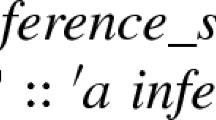Abstract
We present a new proof technique for proving completeness of resolution calculi with equality. It is a direct proof technique in the tradition of the well-known semantic trees. We will show how to enumerate E-interpretations with a device called semantic E-tree and show how such a tree can be used as a basis for a refutation of a given unsatisfiable clause set. As a side effect of our proof technique we obtain new high-level inference rules for treating equality; these rules combine multiple equations during one single inference step. It is a design goal of our technique to be compatible with modern trends in automated reasoning, such as ordering restrictions and general theory reasoning. This work is intended as a basic step forwards in that direction.
Preview
Unable to display preview. Download preview PDF.
Similar content being viewed by others
References
C. Chang and R. Lee. Symbolic Logic and Mechanical Theorem Proving. Academic Press, 1973.
U. Furbach, S. Hölldobler, and J. Schreiber. Paramodulation modulo equality. In Proc. GWAI’89, pages 107–116. Springer, IFB 216, 1989.
Ulrich Furbach, Steffen Hölldobler, and Joachim Schreiber. Horn equational theories and paramodulation. Journal of Automated Reasoning, 3:309–337, 1989.
Steffen Hölldbler. Foundations of Equational Logic Programming, volume 353 of Lecture Notes in Artificial Intelligence. Subseries of Lecture Notes in Computer Science. Springer, 1989.
J. Hsiang and M. Rusinowitch. On word problems in equational theories. In Proc. ICALP’87, pages 54–71. Springer, LNCS 267, 1987.
R.A. Kowalski and P. Hayes. Semantic Trees in Automatic Theorem Proving. In Meltzer and Mitchie, editors, Machine Intelligence 5. Edinburg University Press, 1969.
J. B. Morris. E-Resolution: An Extension of Resolution to include the Equality Relation. In Proc. IJCAI, pages 287–294, 1969.
G. Peterson. A Technique for Establishing Completeness Results in Theorem Proving with Equality. SIAM Journal on Computing, 12(1):82–100, February 1983.
J.A. Robinson. A machine-oriented logic based on the resolution principle. JACM, 12(1):23–41, January 1965.
M.E. Stickel. Theory Resolution: Building in Nonequational Theories. SRI International Research Report Technical Note 286, Artificial Intelligence Center, 1983.
M.E. Stickel. Theory Resolution: Building in Nonequational Theories. SRI International Research Report Technical Note 286, Artificial Intelligence Center, 1983.
M. E. Stickel. Automated deduction by theory resolution. Journal of Automated Reasoning, pages 333–356, 1985.
Author information
Authors and Affiliations
Editor information
Editors and Affiliations
Rights and permissions
Copyright information
© 1991 Springer-Verlag Berlin Heidelberg
About this paper
Cite this paper
Baumgartner, P. (1991). A Completeness Proof Technique for Resolution with Equality. In: Christaller, T. (eds) GWAI-91 15. Fachtagung für Künstliche Intelligenz. Informatik-Fachberichte, vol 285. Springer, Berlin, Heidelberg. https://doi.org/10.1007/978-3-662-02711-0_2
Download citation
DOI: https://doi.org/10.1007/978-3-662-02711-0_2
Publisher Name: Springer, Berlin, Heidelberg
Print ISBN: 978-3-540-54558-3
Online ISBN: 978-3-662-02711-0
eBook Packages: Springer Book Archive




